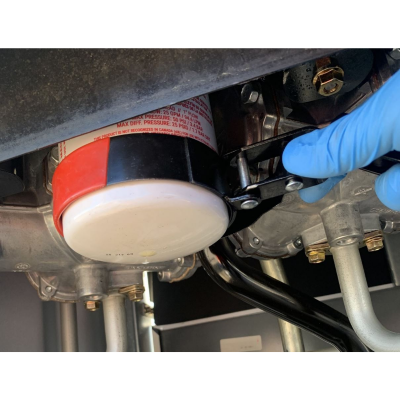Dispenser Filters
Written by: Brian Pottebaum, Director of Training Services
We change the filters on our vehicle with every oil change, right? We do it because a dirty filter will hinder performance and cause damage. Filters that are doing their job will eventually need to be replaced because they are dirty or possible even clogged.
Dispenser maintenance should be no different than the care we give our vehicles. Erratic behavior from the dispenser could be caused by several things, but clogged fuel filters is a common problem. Dispenser filters should be inspected periodically for leaks, corrosion, and damage.
What Do Filters Do?
The fuel filter is designed to catch debris, bacteria and water that flow through the delivery system. As the system operates, and these items continue to build up, the filters become clogged. Clogged filters cause slow product flow, and slow product flow causes unhappy customers. Also, clogged filters can be hard on your system. This can cause the pump to “starve” or cause backpressure, depending on the type of delivery system you have. Older suction pumps generally struggle to keep adequate flow rate anyway, so you should avoid any unnecessary restrictions. Removing the filters and installing a by-pass cap is not the answer. Without the filters, all debris and water that was in the tank is now passed through the system and into your customer’s vehicle. This too will cause unhappy customers and possibly vehicle damage that you will be responsible for.
How Often Should You Change Filters?
Typically, fuel filters on normal use dispensers are changed every year. However, if you have higher throughput and are noticing a slower flow rate at the dispenser, you may change the filters even more frequently. A helpful hint to manage your filter changes is to write the date you changed the filter in a visible spot with a permanent marker. When the date is marked, it is easier to determine when the filter needs to be changed again.
What Filter Should You Use?
Retail dispensers are typically regulated by the Department of Agriculture and Land Stewardship (Weights & Measures Bureau). They conduct routine inspections of the retail dispenser and fuel quality at your facility. To comply with NIST Handbook 130, all gasoline dispensers, including ethanol blends and flex fuels, must be equipped with 10 micron or smaller pore-sized filters. Likewise, all diesel, biodiesel blends, and kerosene dispensers must be equipped with 30 micron or smaller pore-sized filters.
There are also water sensitive fuel filters on the market today. These filters will detect and remove moisture from the fuel as it travels through the dispenser. As the water is absorbed and accumulates in the filter, the filter media will swell and restrict fuel going to the nozzle. As with any filter, make sure you are using compatible filters as well as the correct filter micron size for the intended fuel type. If you are using these filters and you notice flow restriction, be sure to check for water in the tank by using a tank measuring stick and appropriate water-finding paste.

Be Careful
Clogged filters need to be changed. When doing this, it is important to have the system disabled to avoid a fuel spill. Proper steps should be taken to assure that no fuel is lost. Fuel pans that fit below the dispensers in a combination with fuel absorbent pads can help keep the fuel spillage to a minimum. Fuel that is lost below dispensers without containment goes directly into the environment, and this can add up over the life of a site. Dispensers that are equipped with secondary containment should have the same steps taken. Containment was designed to catch spilled fuel, but not store fuel for any amount of time. If spillage occurs, the fuel should be removed immediately.
When changing filters, make sure to use the appropriate filter wrench; NEVER use channel locks or pliers to install the filters. PEI has a short instructional video on changing dispenser filters safely that can be found on YouTube. DOs & DON'Ts: Changing Filters
After the filters are changed, they should be monitored to assure that there is a tight seal. Leaks can occur when the filter is not properly secured. The filters can vibrate loose with operation and cause a severe leak under the dispenser. In addition to a leaking seal, tiny holes can develop through rust spots or filter damage when it was installed. Routine dispenser checks are a must!
Changing filters regularly assures that the highest quality and quantity of fuel is dispensed to the customer.


